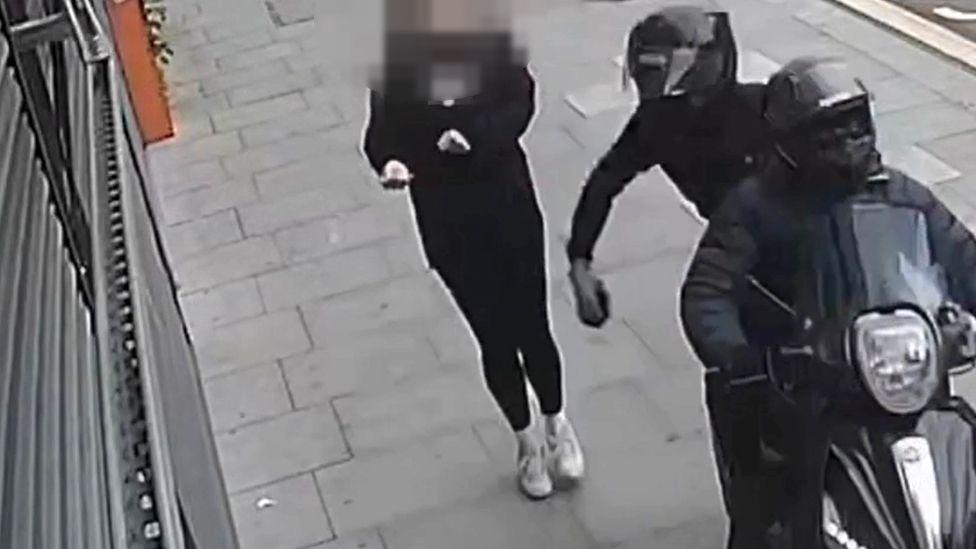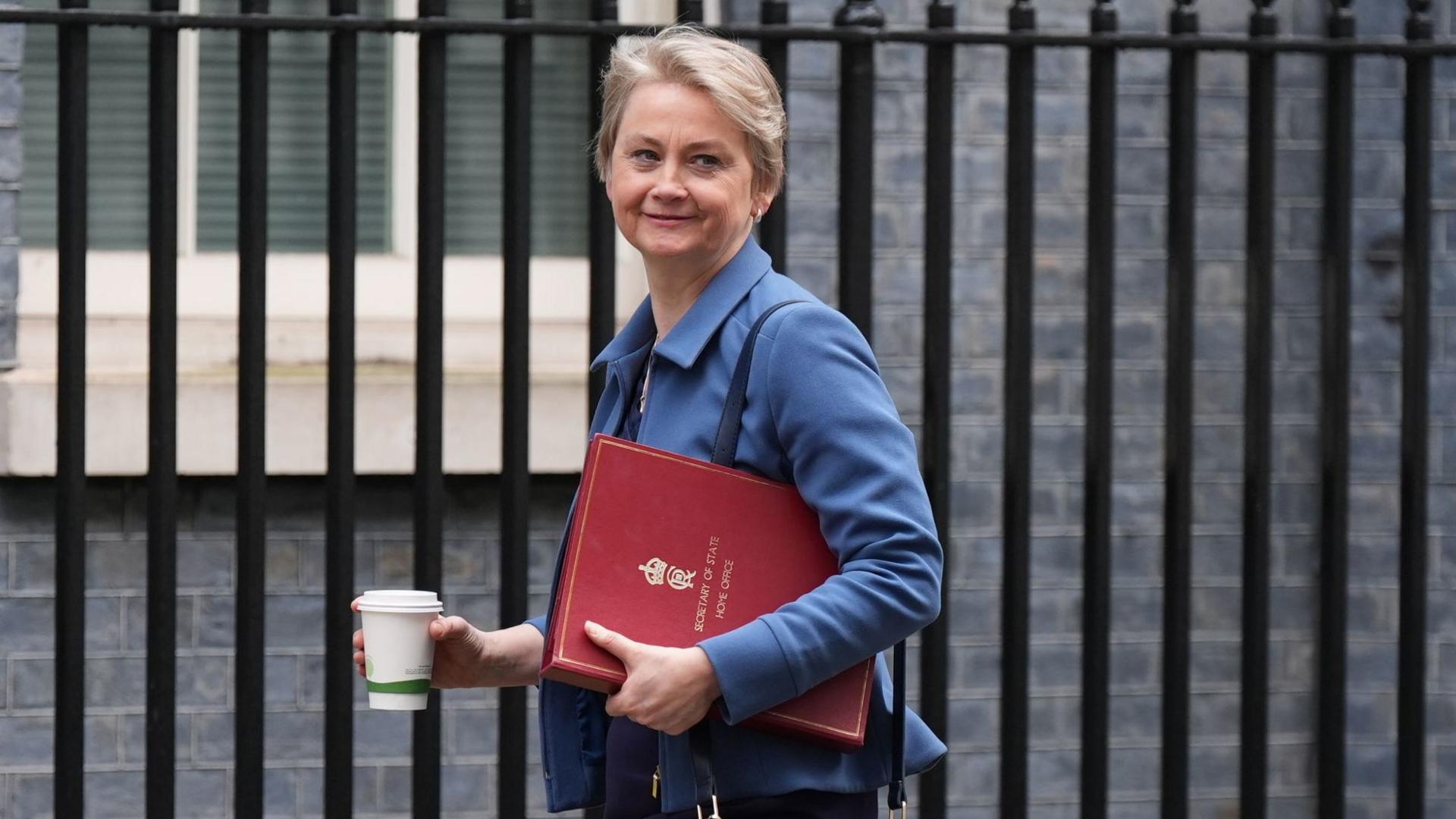New powers planned to search homes for stolen phones

CCTV captured two people on a moped snatching a phone on a street in London
- Published
Police in England and Wales will be given new powers to search homes without a warrant for stolen mobile phones under major legislation which targets theft, street crime and anti-social behaviour.
The Crime and Policing Bill is at the heart of what the government calls its "Safer Streets mission" and ministers want it to become law by the end of the year.
Home Secretary Yvette Cooper told the BBC the bill would address an "epidemic of street theft", including a rise in phone and bag snatching and shoplifting, and introduce new "Respect Orders" with restrictions similar to Anti-Social Behaviour Orders (Asbos).
The Conservatives say the plans have been "copied and pasted from the last government's announcements".
Child exploitation and cuckooing to be criminal offences
- Published22 February
Will Keir Starmer be able to meet his pledges?
- Published13 February
The bill, unveiled in Parliament on Tuesday, pulls together many measures set out in Labour's general election manifesto.
But they come amid questions over whether police have the funding to make the government's plan work.
Under the bill, police would gain the power to enter and search a property without a court warrant for a stolen mobile phone or other items that have been electronically tracked, such as laptops or Bluetooth-tagged bikes.
The power would mean that victims of mobile phone thefts who track their device while it is in the hands of a criminal could call on police to recover it quickly.
Cooper told BBC Radio 4's Today programme she understood the "incredible frustration" of phone theft victims who say "I can track it, I can see where it is - it's in this particular house, it's in this particular location".
"And yet the police can't act fast enough to be able to track it down," she added.
Cooper said "we have to have the stronger powers and action [and] the police say they welcome this".
Asked about the reliability of locator apps, where people can use another device to help track down the location of their missing or stolen phone, being used in police searches, Cooper told BBC Breakfast: "Police will have to make decisions [and] it will need to be signed off by a police inspector, and [they will] need to make decisions about where the evidence is good enough for them to be able to act."
She added that the bill would include scrapping a "ludicrous" £200 threshold for shoplifting, which meant lower value thefts were not currently prioritised by police.

Yvette Cooper said she understood the 'incredible frustration' of phone theft victims
Shadow environment secretary Victoria Atkins told Sky News she was "deeply concerned" that no longer treating shoplifting below £200 as a summary-only offence would have significant long-term effects on crown courts, saying "victims of rape will find it even harder and longer to get their day in court".
But Cooper said addressing lower value thefts which were not likely to lead to prison would stop criminal behaviour escalating to the stage where such sentences would apply.
The bill also includes the government's proposed "Respect Orders" - court-imposed restrictions that will be similar to the Asbo developed in the Tony Blair era, then scrapped by the Conservatives and Liberal Democrats coalition a decade ago.
While Asbos were popular with voters, critics say the restrictions often became unworkable or poorly enforced.
The proposed Respect Orders allow courts to impose restrictions on an individual's behaviour, just like an Asbo.
But they would also be able to compel them to attend programmes such as addiction treatment or anger management courses to change their ways.
Other measures previously announced in the bill include:
An offence of assaulting a shop worker - also a Conservative commitment before the 2024 General Election.
A new police power to seize without warning off-road bikes or e-scooters.
A new offence of spiking drinks, separate to current assault laws.
Giving judges the power to issue a Stalking Prevention Order against a suspect, even if they are not convicted of a crime.
Another already announced power to be added as the bill goes through Parliament will compel online retailers to alert police to bulk or suspicious sales of knives.
Restaurant and retail bosses have written to Cooper to warn the bill "stops short" of protecting delivery riders under the plans. They want the new offence of threatening or assaulting a shop worker in their place of work to include couriers on journeys to and from customers.
Cooper refused to be drawn on whether introducing new criminal offences would add unwelcome extra pressure on police, prisons, and the court system.
Several police forces across England and Wales have previously warned they will have to make cuts to existing officers this year despite receiving extra funding, and Justice Secretary Shabana Mahmood said in December that prisons were at risk of running out of space.
Cooper told the Today programme that a boost in police spending and increasing "early prevention action" would help prevent crimes escalating and prison sentences needing to be imposed, while community measures like tagging and curfews would also be strengthened.
The Home Office says the bill's aims will be delivered by recruiting 13,000 additional neighbourhood officers by 2029 - and the department has pledged £200m specifically towards that.
The National Police Chiefs Council (NPCC ) said last year that forces faced a £1.3bn funding gap, and the available cash was not being shared evenly between forces due to outdated rules.
The Home Office has since confirmed it is putting £1.1bn extra into policing up to April 2026.
But the NPCC has warned that if it is to deliver the "Safer Streets" plan, forces would need a pay settlement that would help them to attract and retain the best possible officers.
Chris Philp, the shadow home secretary, said: "Labour had 14 years to come up with new ideas – but all they have done is copied and pasted what the last government had already announced.
"Labour's funding settlement next year for police forces leaves them £118m short after accounting for salary rises, inflation and the national insurance hike – putting 1,800 police officers at risk.
"Police forces are warning that this will get worse this year due to Labour's inadequate funding settlement."
Get in touch
Have you been a victim of a mobile phone theft? Get in touch

Sign up for our Politics Essential newsletter to read top political analysis, gain insight from across the UK and stay up to speed with the big moments. It'll be delivered straight to your inbox every weekday.